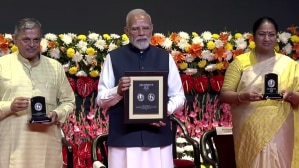3 Rohingya arrested at railway station in Tripura
According to the police, the trio entered India through Irani village in Tripura’s Unakoti district on March 18. They allegedly told Tripura Police that they were headed to Delhi to get an education.
 As per a BSF report, 369 people were arrested, including 59 Rohingya, 160 Indians and 150 Bangladeshi nationals, in different operations in Tripura in 2022. (Representational)
As per a BSF report, 369 people were arrested, including 59 Rohingya, 160 Indians and 150 Bangladeshi nationals, in different operations in Tripura in 2022. (Representational)Three Rohingya were arrested by the Border Security Force (BSF) at Dharmanagar railway station in north Tripura and remanded to three days’ police custody on Tuesday.
A senior official of the state police, who did not want to be named, said that jawans of the 120 Battalion of BSF detained three Rohingya on Monday from Dharmanagar railway station. They were handed over to the Dharmanagar police later and identified as Mohammad Naseer, 20, Mohammad Ismail, 21, and Rahimullah, 18.
According to a preliminary investigation, the police have learnt that the arrested trio came to Bangladesh from Myanmar nearly 30 days ago and entered India through Irani village in Tripura’s Unakoti district on March 18. A diary purchased from Bangladesh with some text in Urdu was recovered from their possession.
The trio allegedly told Tripura police officials that they were headed to Delhi to get an education. All three were produced before a local court on Tuesday on charges of violating the Foreigners Act.
As per a BSF report, 369 people were arrested, including 59 Rohingya, 160 Indians and 150 Bangladeshi nationals, in different operations in Tripura in 2022. The figures were higher than the previous year when 208 ‘intruders’ were arrested in 2021 while trying to cross the Indo-Bangla international border in different parts of Tripura, including 115 Indian nationals and 93 Bangladeshi citizens.
While no Rohingyas or foreigners other than Bangladeshi nationals were arrested crossing the border illegally in 2021, 53 Rohingya and one Nigerian national were arrested in 2019 along the Tripura-Bangla frontiers.
Rohingya hail from the Rakhine State in Myanmar, previously known as Arakan. They have allegedly been facing persecution since the country’s independence in the late 1940s. In 2016, different Rohingya villages in Rakhine State in southwest Myanmar allegedly faced a military crackdown in the wake of a deadly attack by Rohingya rebels on a Myanmar army post.
A military crackdown that started in August 2017 led to the mass exodus of Rohingya men, women and children to all nearby nations, especially Bangladesh.
In a letter in October 2017, the Ministry of Home Affairs ordered all state governments to identify and monitor Rohingya refugees, termed the Rohingya ‘infiltration’ as a burden on the limited resources of the country and said that it aggravated security challenges to the country.



- 01
- 02
- 03
- 04
- 05




























